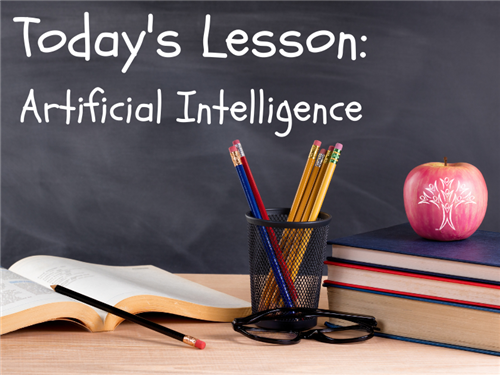- Spokane Public Schools
- More SPS Stories
SPS teachers using Artificial Intelligence to improve their practice
Posted by Kevin Dudley on 4/26/2023

Artificial Intelligence isn’t new, but how AI is being used certainly is. That’s especially true in K-12 education, as AI’s emergence is turning heads throughout the industry.
Instead of shying away from AI, Spokane Public Schools is exploring uses that may improve the way we learn and work. That includes the classroom, of course, which is where Jared Kennedy is embracing the technology.
Kennedy is an instructional coach at Frances Scott Elementary, where he works with teachers to identify instructional goals intended to enhance student achievement. Kennedy connected with SPS special programs coordinator Nick Lundberg, who connected him with software called AI Coach that helps educators assess their own teaching methods.
Here’s how it works: Teachers record themselves giving a lesson, then upload the video to the software, which walks them through a step-by-step assessment based on specific, teacher-selected goals. The software provides feedback as if it were observing in the classroom, much like a principal or other administrator does for evaluations.
“It’s very difficult to watch yourself teach. However, it’s one of the most powerful professional development opportunities as a teacher,” Lundberg said. “So, this is a great first step, because it’s safe. Nobody watches the video except for the teacher. It’s a great entry point for teachers to ger started.”
Kennedy started using AI software in December with some of the teachers at Scott Elementary.
“By being able to reflect with video, it gives you the chance to have that objective evaluation about how the lesson went,” he said. “A lot of times you can glean cool information that’s really actionable.”
The teachers Kennedy works with have provided positive feedback about using the software, which SPS is piloting. While traditional principal evaluations aren’t going anywhere, AI allows teachers to own their assessment and use it for personal professional development.
“They’re the ones truly reflecting and they’re kind of getting stimulating questions from the AI,” Kennedy said. “The big pitch was that it gives you a chance to reflect on your own productions without having to feel any pressure from any other person guiding you through the process.”
Since the teacher is the one choosing the goals, they control their development. AI provides feedback that allows them to think more deeply about their practice.
Like any emerging technology, AI might be viewed with some trepidation or skepticism. That hasn’t been the case with the SPS staff piloting this approach.
“The timing and the explosion into ChatGPT and all that was perfect because it gets people interested in it,” Lundberg said. “So far there hasn’t been any hesitancy that I’ve heard. There’s actually been a lot of interest.”
From a professional development perspective, the next goal for Lundberg is to expand AI's use in schools or intervention groups. Kennedy also sees a day where teams of teachers use it to learn about their teaching styles and learn from others.
“I think the possibilities are pretty endless with this. I think it would be cool to allow teachers to engage with one another to see different video clips and reflect that way,” Kennedy said.
AI is here to stay. Teachers in SPS are embracing it to become better at their craft, which will ultimately help students.
Recent
By Month
- April 2024
- March 2024
- February 2024
- January 2024
- November 2023
- October 2023
- September 2023
- August 2023
- July 2023
- June 2023
- May 2023
- April 2023
- March 2023
- February 2023
- January 2023
- December 2022
- November 2022
- October 2022
- September 2022
- August 2022
- July 2022
- June 2022
- May 2022
- April 2022
- March 2022
- February 2022
- January 2022
- December 2021
- November 2021
- October 2021
- September 2021
- August 2021
- July 2021
- June 2021
- May 2021
- April 2021
- March 2021
- February 2021
- December 2020
- November 2020
- October 2020
- March 2020
- November 2019
- October 2019
- May 2019
- April 2019
- February 2019
- January 2019
- November 2018
- October 2018
- September 2018

